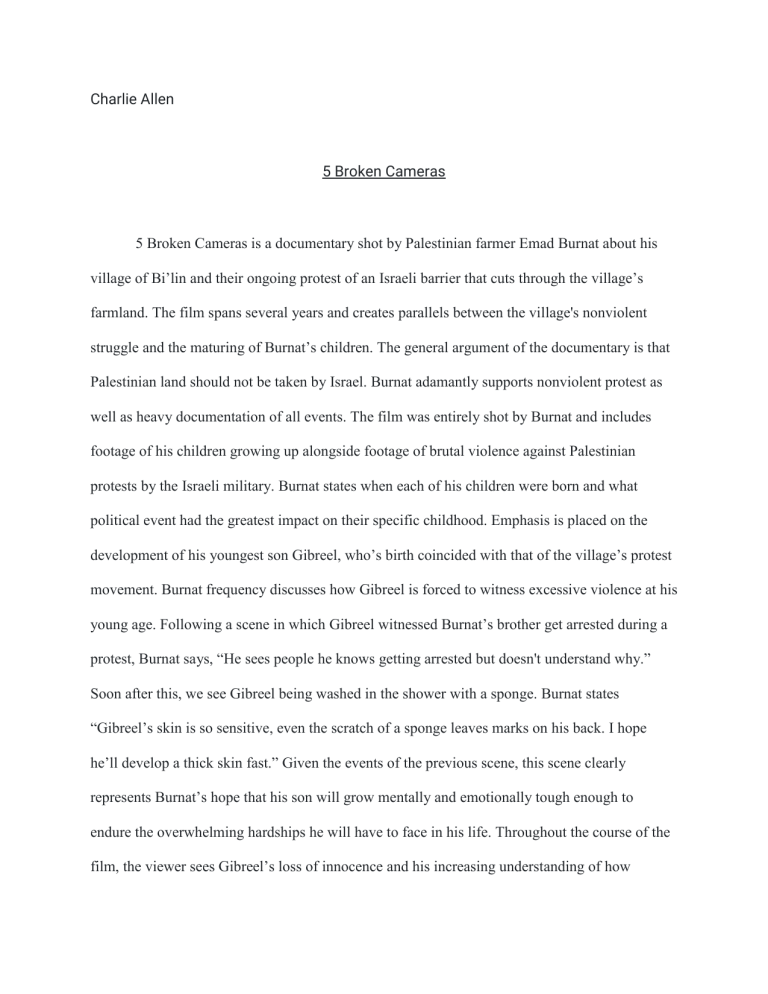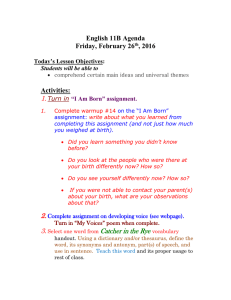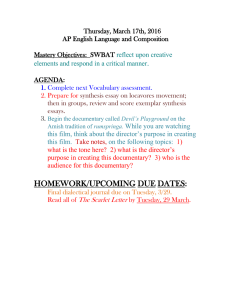
Charlie Allen 5 Broken Cameras 5 Broken Cameras is a documentary shot by Palestinian farmer Emad Burnat about his village of Bi’lin and their ongoing protest of an Israeli barrier that cuts through the village’s farmland. The film spans several years and creates parallels between the village's nonviolent struggle and the maturing of Burnat’s children. The general argument of the documentary is that Palestinian land should not be taken by Israel. Burnat adamantly supports nonviolent protest as well as heavy documentation of all events. The film was entirely shot by Burnat and includes footage of his children growing up alongside footage of brutal violence against Palestinian protests by the Israeli military. Burnat states when each of his children were born and what political event had the greatest impact on their specific childhood. Emphasis is placed on the development of his youngest son Gibreel, who’s birth coincided with that of the village’s protest movement. Burnat frequency discusses how Gibreel is forced to witness excessive violence at his young age. Following a scene in which Gibreel witnessed Burnat’s brother get arrested during a protest, Burnat says, “He sees people he knows getting arrested but doesn't understand why.” Soon after this, we see Gibreel being washed in the shower with a sponge. Burnat states “Gibreel’s skin is so sensitive, even the scratch of a sponge leaves marks on his back. I hope he’ll develop a thick skin fast.” Given the events of the previous scene, this scene clearly represents Burnat’s hope that his son will grow mentally and emotionally tough enough to endure the overwhelming hardships he will have to face in his life. Throughout the course of the film, the viewer sees Gibreel’s loss of innocence and his increasing understanding of how dangerous his circumstances are. Burnat ultimately uses the documentary to display the profound way in which violence can cause children to mature faster than they are supposed to. The documentary is composed of almost entirely primary sources, with all footage coming from Burnat’s cameras. The individuals interviewed include members of the nonviolent protest movement, as well as Burnat’s own family. The film intimately captures the emotions of the villagers and shows how great of an impact the death of fellow villagers has on the community. One notable figure in the documentary was Burnat’s friend Phil, who was universally well-liked in the village and served as a symbol of strength in the community. He was particularly adored by children, including Gibreel. Burnat states, “I think kids like him because they see a lot of hope in him, which is something not easy to find in adults.” Later in the documentary, Phil is shot dead while protesting. The members of the village are devastated, and Burnat captures Gibreel’s response to the situation. He asks, “Why did they shoot Phil? What did he do to them?” This heartbreaking scene demonstrates the impact violence has on the lives of regular people. Gibreel is frustrated that his friend has been killed, and he does not even understand why. This part of the film solidifies Burnat’s assertion that Gibreel’s key developmental years are being shaped by violent circumstances out of his control. The film was co-directed by Burnat alongside Israeli filmmaker Guy Davidi. It was initially funded by the Greenhouse Development Project, a Mediterranean development project that is sponsored by the European Union. The film later received funding from both international and Israeli sources. It is notable that a large portion of the film’s funding was from Israeli sources, as it strongly criticized the actions of the Israeli government and military. After watching the documentary, I would consider it to be left leaning politically due to its focus on the humanitarian crises created by the Israeli-Palestinian conflict. However, the documentary’s focus is by no means to establish itself as a left-wing piece of media. Its content is less concerned with the nuanced political motivations for the conflict as much as it is with the effect the ongoing fighting has on the lives of everyday people. The film was received both positively and negatively by audiences in Israel. It is notable that Israel’s most popular right-wing newspaper, Israel Hayom, named 5 Broken Cameras “the best documentary of the year.” I would strongly recommend this film to a classmate or a family member because of its powerful emotional impact. It shows real people experiencing real violence and how difficult it is to live with. I believe that this documentary is a great tool for fostering empathy. Its raw emotions have the potential to make people reflect on the Isreali-Palestinian conflict in a unique, personal way, regardless of personal biases or political affiliation.



